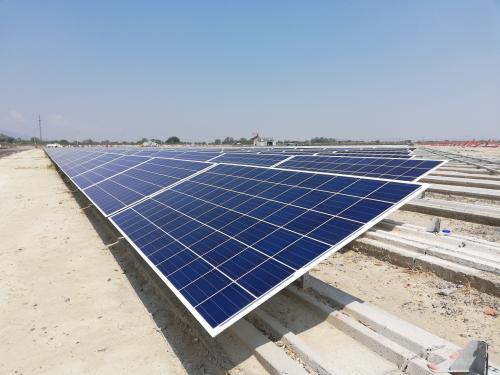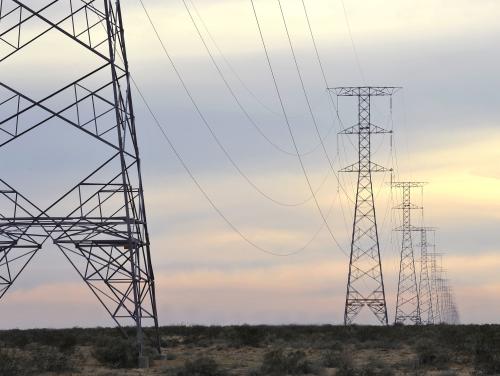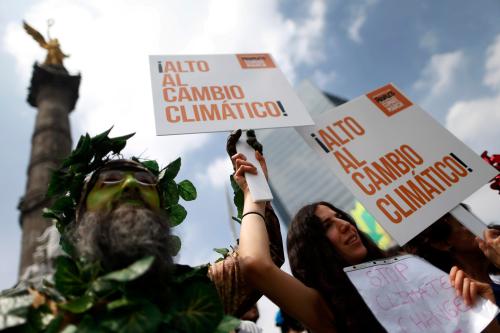Below is a viewpoint from the USMCA Forward 2022 report, which examines key priorities to build a more competitive, inclusive, and sustainable North American economy.
 North America has the potential to become a global energy powerhouse. The region is endowed with an abundance of diverse energy resources and has developed increasingly interdependent energy markets. In this decade, North America could become energy self-sufficient, a net exporter of crude oil and natural gas, and a dynamic producer of renewable energy sources and critical minerals to support the transition to a low-carbon economy. The entering into force of the USMCA provides a sound institutional framework to further support trilateral integration from which to build a post-COVID recovery process that is fair and sustainable. However, the effective cooperation between the U.S., Mexico, and Canada could be strained as partners diverge on goals and vision; specifically, the proposal to overhaul Mexico’s energy policy could derail the effort to partner on combating climate change and developing clean technology solutions.
North America has the potential to become a global energy powerhouse. The region is endowed with an abundance of diverse energy resources and has developed increasingly interdependent energy markets. In this decade, North America could become energy self-sufficient, a net exporter of crude oil and natural gas, and a dynamic producer of renewable energy sources and critical minerals to support the transition to a low-carbon economy. The entering into force of the USMCA provides a sound institutional framework to further support trilateral integration from which to build a post-COVID recovery process that is fair and sustainable. However, the effective cooperation between the U.S., Mexico, and Canada could be strained as partners diverge on goals and vision; specifically, the proposal to overhaul Mexico’s energy policy could derail the effort to partner on combating climate change and developing clean technology solutions.
On September 30, 2021, President Andrés Manuel López Obrador submitted to the Mexican Congress an initiative to Reform the Mexican Constitution on Energy Matters. The initiative aims to nationalize the energy and the mining sectors, return to a dual monopoly model for hydrocarbons and electricity, and establish government control throughout the supply chain of the energy transition process, including science, research and development, and investment.
The initiative is most explicit regarding the power sector: Existing electricity power generation contracts and permits would be canceled; the independent system operator would become a part of national utility company, Comisión Federal de Electricidad (CFE); the Energy Secretariat would absorb the autonomous regulatory bodies; and state-owned enterprises would become government entities.
In this decade, North America could become energy self-sufficient, a net exporter of crude oil and natural gas, and a dynamic producer of renewable energy sources and critical minerals to support the transition to a low-carbon economy.
The initiative would bestow unlimited power to CFE: It would run the electricity sector, be its arbiter and regulator, establish transmission and distribution tariffs and electricity rates, and drive the pace and shape of the energy transition. Furthermore, CFE would have the authority to determine which previous contracts and permits are legal and define the terms for buying from “recognized” private producers. The initiative would take effect retroactively, as it would cancel out all contracts and permits, and seriously undermine the rule of law in Mexico.
Moreover, the initiative would adversely affect Mexico’s renewable energy development. It would cancel Clean Energy Certificates that support the deployment of clean-energy projects, modify the cost-based rules of the electricity market in favor of inefficient CFE plants, and block combined-cycles and renewable-based private production, which generates at a lower cost than CFE. A central aim of the initiative is to ensure that CFE burns in its plants the fuel-oil PEMEX produces in its inefficient refining process for which there is no market. Scientists in Mexico and the U.S. have warned that emissions will increase. A recent study by NREL concludes that under different implementation scenarios CO2 emissions could go up between 26.1 percent and 65.2 percent, whereas total production costs would go up between 31.7 percent and 52.5 percent, seriously undermining Mexico’s competitiveness.
Already, Mexico’s compliance with its Paris Climate Agreement commitments is deemed “highly insufficient,” and it is assumed that the country will not reach the goal of generating 35 percent of its electricity from clean-energy sources by 2024. The initiative would put Mexico on a new high-carbon trajectory, setting it apart from its North American partners.
The implications of the energy reform are profound. If approved in its terms and implemented, Mexico’s competitiveness would be compromised as electricity rates would rise and blackouts increase due to supply shortages, putting at risk Mexico’s economic recovery. Investments would not flow into Mexico given the lack of secure supply of clean energy. Companies with net-zero commitments are likely to move operations across the border. The loss of revenue from existing investments and indirect expropriation of plants would have a rippling effect beyond the energy sector for years to come. Mexico would lose a golden opportunity to attract investments in the dynamic supply chain of clean energies.
The bill is currently under consideration by the Mexican Congress. If approved in its current terms, Mexico will de facto forsake its trade and climate agreements. Mexico would be in violation of its free-trade agreements, including Chapters 2, 11, 14, 22, and 24 of USMCA. A major blow to North American integration and recovery.
The Brookings Institution is committed to quality, independence, and impact.
We are supported by a diverse array of funders. In line with our values and policies, each Brookings publication represents the sole views of its author(s).







Commentary
Mexico’s energy counter-reform could derail the prospects for a prosperous North America
February 28, 2022